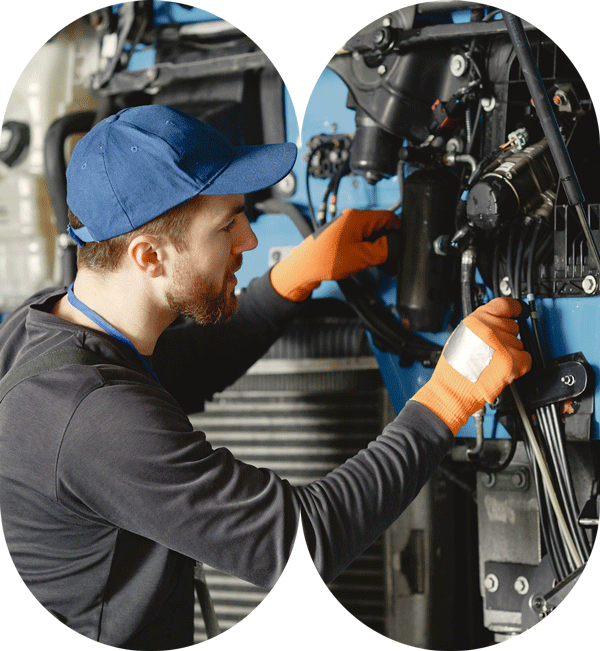Skilled Trades
We offer a wide range of dynamic courses that cater to your unique educational and career goals.

Carpentry and Renovation Technician
A carpentry and renovation technician is a master of the trades, specializing in the construction and rejuvenation of buildings and structures. Armed with a profound knowledge of carpentry principles and techniques, they possess the art of deciphering blueprints and other construction drawings with finesse.
Their diverse array of responsibilities includes erecting new buildings and structures, breathing new life into existing ones, skillfully installing and reviving interior and exterior finishes, crafting and installing cabinets, countertops, and fixtures, meticulously estimating project costs and materials, and overseeing and orchestrating work with precision. While they typically find their home in the construction industry, opportunities abound in property maintenance companies, government agencies, and educational institutions.
Becoming a carpentry and renovation technician can take shape through formal training programs at community colleges or technical schools, or the acquisition of skills through hands-on, on-the-job training.
Diploma in Carpentry and Renovation Technician - Benefits
Overview
The Diploma in Carpentry and Renovation Technician program is a post-secondary program that prepares students for careers in the carpentry and renovation industry. Carpenters and renovation technicians build, repair, and renovate wooden structures, such as houses, decks, and fences. They work in a variety of settings, including construction companies, renovation companies, and self-employed.
Coursework
The Diploma in Carpentry and Renovation Technician program typically covers a wide range of topics, including:
- Fundamentals of carpentry: This course covers the basic principles of carpentry, such as wood types, tools,and techniques.
- Construction methods and materials:This course covers the different types of construction methods and materials used in carpentry, such as framing,roofing, and siding.
- Building codes and safety: This course covers the building codes and safety regulations that apply to carpentry work.
- Renovation techniques: This course covers the different techniques used to renovate wooden structures, such as kitchens, bathrooms, and basements.
In addition to these general topics, the Diploma in Carpentry and Renovation Technician program may also offer specialized courses in areas such as:
- Cabinetmaking: This course covers the skills and knowledge needed to build custom cabinets.
- Finish carpentry: This course covers the skills and knowledge needed to finish wooden surfaces, such as staining and varnishing.
- Green carpentry: This course covers the principles and practices of green carpentry, such as using sustainable materials and energy-efficient construction techniques.
Practicum
Students in the Diploma in Carpentry and Renovation Technician program will also complete a practicum at a construction company or renovation company. This practicum provides students with the opportunity to gain hands-on experience working on carpentry and renovation projects under the supervision of experienced tradespeople.
Career Opportunities
Upon completion of the Diploma in Carpentry and Renovation Technician program, students will be prepared to pursue a career as a carpenter or renovation technician. Carpenters and renovation technicians can work in a variety of settings, including construction companies, renovation companies, and self-employed.
Job Outlook
The job outlook for carpenters and renovation technicians is projected to grow faster than average over the next decade. This is due to the increasing demand for new construction and the increasing need for renovations to existing structures.
Salary Potential
Carpenters and renovation technicians typically earn a good salary. The median annual wage for carpenters was $50,520 in May 2021, and the median annual wage for construction and building inspectors was $53,750 in May 2021.
Conclusion
The Diploma in Carpentry and Renovation Technician program is a great option for students who are interested in a rewarding career in the carpentry and renovation industry. The program provides students with the skills and knowledge they need to be successful in this field.
In addition to the above, here are some other benefits of pursuing a Diploma in Carpentry and Renovation Technician:
- Job security: The carpentry and renovation industry is relatively recession-proof, as people and businesses still need to build, repair,and renovate structures even during economic downturns.
- Opportunities for advancement:Carpenters and renovation technicians can advance to positions such as project manager or superintendent.They can also start their own carpentry or renovation business.
- Personal satisfaction: Carpenters and renovation technicians play an important role in building and maintaining the infrastructure that we rely on every day. They also have the opportunity to be creative and use their skills to create beautiful and functional spaces.
If you are interested in a rewarding career in the carpentry and renovation industry, a Diploma in Carpentry and Renovation Technician may be the right choice for you.
Global universities offering this course:
- Australia Institute of Business and Technology (AIBT), Australia
- Menzies Institute of Technology,Australia
- American Skill University, United States
- New Zealand Institute of Technology,New Zealand
- The Open University, United Kingdom
- Ashworth College, United States
- Penn Foster College, United States
Diploma in Carpentry and Renovation Technician - Syllabus
Semester 1
Module 1: Introduction to Carpentry and Renovation
What is carpentry and renovation?
The history and development of carpentry and renovation
The different types of carpentry and renovation projects
The tools and equipment used in carpentry and renovation
Module 2: Carpentry Basics
Woodworking basics
Framing and construction basics
Trim and finish carpentry basics
Module 3: Renovation Basics
Demolition and gutting
Insulation and drywall
Flooring and countertops
Plumbing and electrical
Module 4: Construction Codes and Safety
International Residential Code (IRC)
Occupational Safety and Health Administration (OSHA) regulations
How to work safely and efficiently on a construction site
Semester 2
Module 5: Advanced Carpentry and Renovation Techniques
Custom woodworking
Stair building
Cabinetmaking
Green building techniques
Module 6: Project Management and Estimation
How to plan and manage a carpentry and renovation project
How to estimate the cost of a carpentry and renovation project
Module 7: Business Practices for Carpenters and Renovation Technicians
How to start and run a carpentry and renovation business
How to market and sell your carpentry and renovation services
How to manage your finances and taxes
Reference Books:
Carpentry & Construction Manual - Frank D. Graham
Modern Carpentry - Gary Katz
Carpentry and Construction - Fred A. Mansperger
The Complete Book of Home Renovation - Scott McGillivray
Renovation 4 Dummies - Mark McCullough
Journals:
Fine Woodworking Magazine
Wood Magazine
Journal of Light Construction
Professional Builder Magazine
Remodeling Magazine
Related Websites:
National Association of Home Builders (NAHB)
National Association of the Remodeling Industry (NARI)
American Wood Council
Occupational Safety and Health Administration (OSHA)
International Code Council
Useful YouTube Links:
How to Build a Deck
How to Install a New Roof
How to Renovate a Kitchen
How to Frame a Wall
How to Finish Carpentry
Ted Talks:
The Future of Green Building
The Importance of Home Renovation
How to Make Your Home More Energy-Efficient
The Art of Carpentry
Audio Books:
Carpentry & Construction Manual - Frank D. Graham
Modern Carpentry - Gary Katz
Carpentry and Construction - Fred A. Mansperger
The Complete Book of Home Renovation - Scott McGillivray
Renovation 4 Dummies - Mark McCullough
Automotive Service Technician or Mechanic
Automotive service technicians, commonly known as mechanics, are the driving force behind the maintenance and repair of cars and light trucks. They excel in the art of inspection, diagnosis, and restoration of both mechanical and electrical systems, along with the replacement of worn or damaged parts. Routine maintenance tasks, such as oil changes, brake inspections, and tune-ups, are their forte.
Becoming an automotive service technician is a journey that often commences with formal training at a technical institute or within a garage, but some opt for learning their skills through hands-on, on-the-job training. These professionals command a strong grasp of automotive mechanics and electrical systems, proficiently handling an array of tools and equipment, from hand tools to power tools and diagnostic instruments.
Their key roles encompass vehicle inspections for issue diagnosis, restoration of mechanical and electrical systems, part replacement, routine maintenance, and staying at the forefront of the latest automotive technologies. In addition, providing exceptional customer service remains a hallmark of their craft


Diploma in Automotive Service Technician - Benefits
The Diploma in Automotive Service Technician program is a post-secondary program that prepares students for careers in the automotive industry. Automotive service technicians diagnose, repair, and maintain motor vehicles. They work in a variety of settings, including dealerships, independent repair shops, and government agencies.
Coursework
The Diploma in Automotive Service Technician program typically covers a wide range of topics, including:
- Fundamentals of automotive technology: This course covers the basic principles of operation of motor vehicles, including engines,transmissions, brakes, and electrical systems.
- Automotive diagnosis and troubleshooting: This course covers how to diagnose and troubleshoot problems with motor vehicles.
- Automotive repair and maintenance:This course covers how to repair and maintain motor vehicles, including replacing worn parts and performing preventive maintenance tasks.
- Automotive safety: This course covers the importance of safety in the automotive industry, as well as how to safely work on motor vehicles.
In addition to these general topics, the Diploma in Automotive Service Technician program may also offer specialized courses in areas such as:
- Alternative fuel vehicles: This course covers the repair and maintenance of alternative fuel vehicles, such as electric vehicles and hybrid vehicles.
- Advanced driver assistance systems (ADAS): This course covers the repair and maintenance of advanced driver assistance systems, such as lane departure warning and automatic emergency braking.
- Heavy-duty vehicles: This course covers the repair and maintenance of heavy-duty vehicles, such as trucks and buses.
- Automotive electronics: This course covers the diagnosis and repair of automotive electronic systems, such as engine control units and anti-lock braking systems.
Practicum
Students in the Diploma in Automotive Service Technician program will also complete a practicum at an automotive dealership or repair shop. This practicum provides students with the opportunity to gain hands-on experience working on motor vehicles under the supervision of experienced technicians.
Career Opportunities
Upon completion of the Diploma in Automotive Service Technician program, students will be prepared to pursue a career as an automotive service technician. Automotive service technicians can work in a variety of settings, including dealerships, independent repair shops, and government agencies.
Job Outlook
The job outlook for automotive service technicians is projected to grow much faster than average over the next decade. This is due to the increasing complexity of motor vehicles and the increasing demand for qualified technicians.
Salary Potential
Automotive service technicians typically earn a good salary. The median annual wage for automotive service technicians and mechanics was $48,710 in May 2021.
Conclusion
The Diploma in Automotive Service Technician program is a great option for students who are interested in a rewarding career in the automotive industry. The program provides students with the skills and knowledge they need to be successful in this field.
In addition to the above, here are some other benefits of pursuing a Diploma in Automotive Service Technician:
- Job security: The automotive industry is relatively recession-proof, as people and businesses still need to use their vehicles even during economic downturns.
- Opportunities for advancement:Automotive service technicians can advance to positions such as service manager or shop foreman. They can also start their own automotive repair business.
- Personal satisfaction: Automotive service technicians play an important role in keeping people and businesses moving by diagnosing, repairing, and maintaining motor vehicles.
If you are interested in a rewarding career in the automotive industry, a Diploma in Automotive Service Technician
Global universities offering this course:
- Australia Institute of Business and Technology (AIBT), Australia
- Menzies Institute of Technology,Australia
- American Skill University, United States
- New Zealand Institute of Technology,New Zealand
- The Open University, United Kingdom
- Ashworth College, United States
- Penn Foster College, United States
Diploma in Automotive Service Technician - Syllabus
Semester 1
Module 1: Introduction to Automotive Service
What is automotive service?
The history and development of automotive service
The different types of automotive service technicians
The different types of automotive repair shops
Module 2: Automotive Engines
The different types of automotive engines
The components of an automotive engine
How an automotive engine works
Module 3: Automotive Drivetrains
The different types of automotive drivetrains
The components of an automotive drivetrain
How an automotive drivetrain works
Module 4: Automotive Braking and Suspension
The different types of automotive braking systems
The components of an automotive braking system
How an automotive braking system works
The different types of automotive suspension systems
The components of an automotive suspension system
How an automotive suspension system works
Semester 2
Module 5: Automotive Electrical and Electronic Systems
The different types of automotive electrical systems
The components of an automotive electrical system
How an automotive electrical system works
The different types of automotive electronic systems
The components of an automotive electronic system
How an automotive electronic system works
Module 6: Automotive Diagnosis and Troubleshooting
How to diagnose and troubleshoot automotive problems
How to use diagnostic tools and equipment
Module 7: Automotive Maintenance and Repair
How to perform routine maintenance on an automotive vehicle
How to repair common automotive problems
Module 8: Automotive Safety
Safety procedures when working on automotive vehicles
How to prevent accidents and injuries
Reference Books:
Automotive Technology: Principles, Diagnosis, and Service - James D. Halderman
How to Diagnose and Repair Automotive Electrical Systems - Tracy Martin
Modern Automotive Technology - James E. Duffy
Automotive Engine Repair - James E. Duffy
Automotive Transmissions and Transaxles - James E. Duffy
Journals:
Automotive Engineering Magazine
Automotive Service Professional Magazine
Ward's Automotive World
Automotive News
Automotive Technology Magazine
Related Websites:
National Institute for Automotive Service Excellence (ASE)
Society of Automotive Engineers (SAE)
Vehicle Maintenance and Repair Information System (VMRIS)
National Highway Traffic Safety Administration (NHTSA)
Environmental Protection Agency (EPA)
Useful YouTube Links:
How to Change an Oil Filter
How to Flush a Radiator
How to Replace a Brake Pad
How to Change a Tire
How to Jump Start a Car
Ted Talks:
The Future of Transportation
The Importance of Vehicle Safety
How to Reduce Your Car's Environmental Impact
The Art of Car Repair
Audio Books:
Automotive Technology: Principles, Diagnosis, and Service - James D. Halderman
How to Diagnose and Repair Automotive Electrical Systems - Tracy Martin
Modern Automotive Technology - James E. Duffy
Automotive Engine Repair - James E. Duffy
Automotive Transmissions and Transaxles - James E. Duffy

Heavy Duty Equipment Technician
A heavy duty equipment technician, also recognized as a heavy equipment mechanic, is a tradesperson skilled in the maintenance, repair, and rejuvenation of heavy machinery. They command expertise over an array of colossal machines, from bulldozers and excavators to graders, loaders, and dump trucks, ensuring their safe and efficient operation.
These technicians typically find their niche in industries such as construction, mining, forestry, and even transportation, agriculture, and manufacturing. Their versatile role encompasses inspecting and diagnosing machinery issues, replacing worn or damaged components, executing routine maintenance like oil changes and tune-ups, and conducting major overhauls, including engines and transmissions.
With an arsenal of hand tools, power tools, and diagnostic equipment, they troubleshoot electrical and hydraulic systems, staying attuned to the latest heavy equipment technologies. Becoming a heavy duty equipment technician entails formal training at a technical school or hands-on on-the-job learning.
Diploma in Heavy Duty Equipment Technician - Benefits
Overview
The Diploma in Heavy Duty Equipment Technician program is a post-secondary program that prepares students for careers in the heavy duty equipment industry. Heavy duty equipment technicians repair and maintain heavy duty equipment, such as bulldozers, excavators, and dump trucks. They work in a variety of industries, including construction, mining, and forestry.
Coursework
The Diploma in Heavy Duty Equipment Technician program typically covers a wide range of topics, including:
- Fundamentals of heavy duty equipment: This course covers the basic principles of operation of heavy duty equipment, such as engines,hydraulic systems, and transmissions.
- Heavy duty equipment diagnosis and troubleshooting: This course covers how to diagnose and troubleshoot problems with heavy duty equipment.
- Heavy duty equipment repair and maintenance: This course covers how to repair and maintain heavy duty equipment, including replacing worn parts and performing preventive maintenance tasks.
- Heavy duty equipment safety: This course covers the importance of safety in the heavy duty equipment industry,as well as how to safely work on heavy duty equipment.
In addition to these general topics, the Diploma in Heavy Duty Equipment Technician program may also offer specialized courses in areas such as:
- Construction equipment: This course covers the specific requirements for the repair and maintenance of construction equipment, such as bulldozers, excavators, and graders.
- Mining equipment: This course covers the specific requirements for the repair and maintenance of mining equipment,such as haul trucks and loaders.
- Forestry equipment: This course covers the specific requirements for the repair and maintenance of forestry equipment, such as skidders and harvesters.
Practicum
Students in the Diploma in Heavy Duty Equipment Technician program will also complete a practicum at a heavy duty equipment dealership or repair shop. This practicum provides students with the opportunity to gain hands-on experience working on heavy duty equipment under the supervision of experienced technicians.
Career Opportunities
Upon completion of the Diploma in Heavy Duty Equipment Technician program, students will be prepared to pursue a career as a heavy duty equipment technician. Heavy duty equipment technicians can work in a variety of industries, including construction, mining, and forestry.
Job Outlook
The job outlook for heavy duty equipment technicians is projected to grow much faster than average over the next decade. This is due to the increasing demand for heavy duty equipment in a variety of industries, as well as the aging workforce of heavy duty equipment technicians.
Salary Potential
Heavy duty equipment technicians typically earn a good salary. The median annual wage for heavy equipment mechanics and repairers was $56,240 in May 2021.
Conclusion
The Diploma in Heavy Duty Equipment Technician program is a great option for students who are interested in a rewarding career in the heavy duty equipment industry. The program provides students with the skills and knowledge they need to be successful in this field.
In addition to the above, here are some other benefits of pursuing a Diploma in Heavy Duty Equipment Technician:
- Job security: The heavy duty equipment industry is relatively recession-proof, as heavy duty equipment is essential for many industries.
- Opportunities for advancement:Heavy duty equipment technicians can advance to positions such as service manager or shop foreman. They can also start their own heavy duty equipment repair business.
- Personal satisfaction: Heavy duty equipment technicians play an important role in keeping the economy running by maintaining and repairing the equipment that is used to build roads, bridges, and other infrastructure.
If you are interested in a rewarding career in the heavy duty equipment industry, a Diploma in Heavy Duty Equipment Technician may be the right choice for you.
Global universities offering this course:
- Centennial College, Canada
- New Zealand Institute of Technology,New Zealand
- American Skil University, United States
- University of Phoenix, United States
- Penn Foster College, United States
- Ashworth College, United States
Diploma in Heavy Duty Equipment Technician - Syllabus
Semester 1
Module 1: Introduction to Heavy Duty Equipment
What is heavy duty equipment?
The different types of heavy duty equipment
The components of heavy duty equipment
How heavy duty equipment works
Module 2: Heavy Duty Equipment Engines
The different types of heavy duty equipment engines
The components of a heavy duty equipment engine
How a heavy duty equipment engine works
Module 3: Heavy Duty Equipment Hydraulics
The basics of hydraulics
The components of a heavy duty equipment hydraulic system
How a heavy duty equipment hydraulic system works
Module 4: Heavy Duty Equipment Electrical Systems
The basics of electricity
The components of a heavy duty equipment electrical system
How a heavy duty equipment electrical system works
Semester 2
Module 5: Heavy Duty Equipment Diagnosis and Troubleshooting
How to diagnose and troubleshoot heavy duty equipment problems
How to use diagnostic tools and equipment
Module 6: Heavy Duty Equipment Maintenance and Repair
How to perform routine maintenance on heavy duty equipment
How to repair common heavy duty equipment problems
Module 7: Heavy Duty Equipment Safety
Safety procedures when working on heavy duty equipment
How to prevent accidents and injuries
Reference Books:
Heavy Equipment Operators and Mechanics: Career Preparation (NCCER) - NCCER
Heavy Equipment Training Manual (NCCER) - NCCER
Construction Equipment Maintenance Manual (USACE) - USACE
Diesel Engine Technology (CDX) - Delmar Cengage Learning
Mobile Hydraulic Technology (CDX) - Delmar Cengage Learning
Journals:
Diesel Progress Magazine
Construction Equipment Guide Magazine
Heavy Equipment World Magazine
Equipment & Maintenance Magazine
Construction Equipment Operator Magazine
Related Websites:
National Center for Construction Education and Research (NCCER)
US Army Corps of Engineers (USACE)
Diesel Technology Forum
Association of Equipment Manufacturers (AEM)
American Society of Mechanical Engineers (ASME)
Useful YouTube Links:
How to Change a Heavy Duty Engine Filter
How to Flush a Heavy Duty Radiator
How to Replace a Heavy Duty Brake Pad
How to Change a Heavy Duty Tire
How to Jump Start a Heavy Duty Truck
Ted Talks:
The Future of Construction
The Importance of Heavy Duty Equipment Maintenance
How to Make Construction Safer
The Art of Heavy Duty Equipment Repair
Audio Books:
Heavy Equipment Operators and Mechanics: Career Preparation (NCCER) - NCCER
Heavy Equipment Training Manual (NCCER) - NCCER
Construction Equipment Maintenance Manual (USACE) - USACE
Diesel Engine Technology (CDX) - Delmar Cengage Learning
Mobile Hydraulic Technology (CDX) - Delmar Cengage Learning
Electrical wireman
An electrical wireman, a distinguished tradesperson, specializes in the art of electrical wiring and equipment installation, maintenance, and repair. Their expertise extends across a spectrum of projects, ranging from residential and commercial construction to industrial and manufacturing facilities. To excel in this role, electrical wiremen must possess an in-depth comprehension of the National Electrical Code (NEC) and other pertinent electrical codes and standards.


Plumber
Plumbers, skilled tradespeople, are specialists in the installation, maintenance, and restoration of plumbing systems. They engage in diverse projects, spanning from residential and commercial construction to industrial and manufacturing settings. Plumbers wield a profound understanding of plumbing codes and standards, adeptly navigating a repertoire of tools and equipment, including hand tools, power tools, and diagnostic instruments.
Diploma in Electrical Wireman and Plumber - Benefits
Coursework
The Diploma in Electrical Wireman and Plumber program typically covers a wide range of topics, including:
- Electrical theory: This course covers the basic principles of electricity, such as voltage, amperage, and resistance.Students will learn how to read and interpret electrical diagrams, and how to calculate electrical loads.
- Electrical wiring and equipment: This course covers the different types of electrical wiring and equipment, as well as how to install, maintain, and repair them. Students will learn about residential, commercial, and industrial electrical wiring systems.
- Plumbing theory: This course covers the basic principles of plumbing, such as water pressure, drainage, and venting. Students will learn how to read and interpret plumbing diagrams, and how to calculate pipe sizes.
- Plumbing systems: This course covers the different types of plumbing systems, such as water supply systems,drainage systems, and venting systems.Students will learn how to install,maintain, and repair plumbing systems.
- Building codes and safety: This course covers the building codes and safety regulations that apply to electrical and plumbing work. Students will learn how to comply with these codes and regulations to ensure the safety of their clients and the public.
In addition to these general topics, the Diploma in Electrical Wireman and Plumber program may also offer specialized courses in areas such as:
- Commercial electrical wiring: This course covers the specific requirements for electrical wiring in commercial buildings.
- Industrial electrical wiring: This course covers the specific requirements for electrical wiring in industrial settings.
- Residential electrical wiring: This course covers the specific requirements for electrical wiring in residential homes.
- Commercial plumbing: This course covers the specific requirements for plumbing systems in commercial buildings.
- Industrial plumbing: This course covers the specific requirements for plumbing systems in industrial settings.
- Residential plumbing: This course covers the specific requirements for plumbing systems in residential homes.
Practicum
Students in the Diploma in Electrical Wireman and Plumber program will also complete a practicum in an electrical or plumbing shop. This practicum provides students with the opportunity to gain hands-on experience working on electrical and plumbing systems under the supervision of experienced electricians and plumbers.
Career Opportunities
Upon completion of the Diploma in Electrical Wireman and Plumber program, students will be prepared to pursue a career as an electrical wireman or plumber. Electrical wiremen and plumbers can work in a variety of settings, including construction companies, electrical and plumbing shops, and government agencies.
Job Outlook
The job outlook for electrical wiremen and plumbers is projected to grow much faster than average over the next decade. This is due to the increasing demand for new construction and the increasing need for maintenance and repairs on existing electrical and plumbing systems.
Salary Potential
Electrical wiremen and plumbers typically earn a good salary. The median annual wage for electricians was $56,180 in May 2021, and the median annual wage for plumbers, pipefitters, and steamfitters was $55,160 in May 2021.
Conclusion
The Diploma in Electrical Wireman and Plumber program is a great option for students who are interested in a rewarding career in the electrical or plumbing trades. The program provides students with the skills and knowledge they need to be successful in these fields.
Global universities offering this course:
- Australia Institute of Business and Technology (AIBT), Australia
- Menzies Institute of Technology,Australia
- American Skill University, United States
- The Open University, United Kingdom
- Ashworth College, United States
- Penn Foster College, United States
Diploma in Electrical Wireman and Plumber - Syllabus
Semester 1
Module 1: Introduction to Electrical Wiring and Plumbing
What is electrical wiring?
The history and development of electrical wiring
The different types of electrical wiring
The different components of an electrical system
What is plumbing?
The history and development of plumbing
The different types of plumbing systems
The different components of a plumbing system
Module 2: Electrical Safety and Plumbing Safety
* Electrical safety procedures
* Plumbing safety procedures
* How to prevent accidents and injuries
Module 3: Electrical Wiring and Plumbing Tools and Equipment
* Common electrical wiring tools and equipment
* Common plumbing tools and equipment
* How to use electrical wiring and plumbing tools and equipment safely and effectively
Module 4: Basic Electrical Wiring and Plumbing Skills
* How to wire a simple circuit
* How to install a basic plumbing fixture
Semester 2
Module 5: Advanced Electrical Wiring and Plumbing Skills
* How to wire complex circuits
* How to install complex plumbing fixtures
* How to troubleshoot and repair electrical and plumbing problems
Module 6: Electrical and Plumbing Codes and
Regulations
* National Electrical Code (NEC)
* Uniform Plumbing Code (UPC)
* How to comply with electrical and plumbing codes and regulations
Module 7: Electrical and Plumbing Maintenance
* How to perform routine maintenance on electrical and plumbing systems
* How to identify and fix common electrical and plumbing problems
Module 8: Professional Development
* Ethical considerations in electrical wiring and plumbing practice
* How to maintain your skills and knowledge as an electrical wireman and plumber
Reference Books:
Electrical Wiring: Residential - Ray C. Mullin
Plumbing: Principles and Practices - Larry L. Smith
National Electrical Code (NEC) - National Fire Protection Association
Uniform Plumbing Code (UPC) - International Association of Plumbing and Mechanical Officials
Journals:
Electrical Contractor Magazine
Plumbing Magazine
National Association of Electrical Contractors (NECA) Newsletter
American Society of Plumbing Engineers (ASPE) Magazine
Related Websites:
National Fire Protection Association (NFPA)
International Association of Plumbing and Mechanical Officials (IAPMO)
National Association of Electrical Contractors (NECA)
American Society of Plumbing Engineers (ASPE)
Occupational Safety and Health Administration (OSHA)
Useful YouTube Links:
How to Wire a Simple Circuit
How to Install a Faucet
How to Fix a Leaky Pipe
How to Troubleshoot an Electrical Outlet
How to Maintain Your Hot Water Heater
Ted Talks:
The Future of Energy
The Importance of Clean Water
How to Make Your Home More Sustainable
The Art of Home Repair
Audio Books:
Electrical Wiring: Residential - Ray C. Mullin
Plumbing: Principles and Practices - Larry L. Smith
Diploma in Air-conditioning and Refrigeration Technology
Explore the fascinating realm of Air-conditioning and Refrigeration Technology with our specialized Diploma program at American Skill University. Designed for individuals eager to delve into the cooling and refrigeration industry, this comprehensive course covers everything from fundamental principles to advanced technologies. Our experienced instructors guide you through the intricacies of air-conditioning systems, refrigeration cycles, and cutting-edge technologies, ensuring you gain hands-on expertise in installation, maintenance, and troubleshooting. Whether you aspire to become a skilled technician or seek to expand your knowledge in the HVAC&R field, our diploma program equips you with the practical skills and theoretical understanding required in this dynamic industry. Join American Skill University to embark on a rewarding journey into Air-conditioning and Refrigeration Technology, where innovation meets hands-on application. Your path to becoming a proficient HVAC&R professional begins here.

Diploma in Air-conditioning and Refrigeration Technology - Benefits
In a world driven by the pursuit of comfort and convenience, the demand for skilled professionals in the air-conditioning and refrigeration industry has never been higher. As technology advances and energy efficiency becomes an increasingly pressing concern, the need for individuals equipped with the knowledge and expertise to design, install, maintain, and repair cooling systems is paramount.
Embark on a Thriving Career in Air-conditioning and Refrigeration
A Diploma in Air-conditioning and Refrigeration Technology opens doors to a dynamic and rewarding career in the ever-evolving field of cooling systems. This comprehensive program delves into the fundamental principles of thermodynamics, heat transfer, and fluid mechanics, providing you with a solid foundation for understanding the operation and maintenance of air-conditioning and refrigeration equipment.
Equip Yourself with Specialized Skills
The curriculum encompasses a wide range of specialized topics, including:
- Principles of refrigeration cycles and components
- Design and selection of air-conditioning systems
- Troubleshooting and repair of air-conditioning and refrigeration equipment
- Electrical control systems for cooling systems
- Energy efficiency and environmental considerations
Gain Practical Expertise through Hands-on Learning
Complementing theoretical knowledge, the program emphasizes practical hands-on training, allowing you to gain valuable experience in:
- Installation and commissioning of air-conditioning and refrigeration systems
- Fault diagnosis and repair using industry-standard tools and techniques
- Performance testing and optimization of cooling systems
- Adherence to safety regulations and best practices
Unlock a World of Career Opportunities
With a Diploma in Air-conditioning and Refrigeration Technology, you open doors to a multitude of rewarding career opportunities in diverse industries, including:
- HVAC (Heating, Ventilation, and Air Conditioning) companies
- Refrigeration and appliance manufacturing firms
- Building construction and maintenance companies
- Facility management and engineering firms
- Consulting and technical services providers
Global Universities Offering a Diploma in Air-conditioning and Refrigeration Technology
Pursue your passion for cooling technology by enrolling in a Diploma in Air-conditioning and Refrigeration Technology at one of these esteemed universities worldwide:
- Dun Laoghaire Institute of Technology(Ireland)
- Swinburne University (Australia)
- Northern Alberta Institute of Technology (Canada)
- American Skill University, USA
- Technical University of Kenya (Kenya)
- University of Technology Mauritius(Mauritius)
- Universidad Tecnológica de Panamá(Panama)
Shape Your Future with a Diploma in Air-conditioning and Refrigeration Technology
Step into the exciting world of air-conditioning and refrigeration technology and embark on a fulfilling career path that will keep you at the forefront of cooling innovation.
Diploma in Air-conditioning and Refrigeration Technology - Syllabus
Course Overview
This comprehensive diploma course provides a thorough understanding of air conditioning and refrigeration technology, encompassing both theoretical and practical aspects. Participants will gain hands-on experience in designing, installing, maintaining, and troubleshooting air conditioning and refrigeration systems. Upon completion, graduates will be equipped with the skills necessary to succeed in the dynamic and growing HVAC industry.
Course Objectives
Upon successful completion of this course, participants will be able to:
- Understand the fundamental principles of thermodynamics, psychrometrics,and heat transfer related to air conditioning and refrigeration systems.
- Identify and classify various types of air conditioning and refrigeration systems.
- Design and select appropriate air conditioning and refrigeration systems for different applications.
- Install, commission, and maintain air conditioning and refrigeration systems.
- Diagnose and troubleshoot common air conditioning and refrigeration problems.
- Comply with relevant safety standards and regulations.
Course Outline
Module 1: Fundamentals of Air Conditioning and Refrigeration
- Introduction to thermodynamics,psychrometrics, and heat transfer
- Properties of refrigerants
- Refrigeration cycles and system components
- Air conditioning principles and components
- Psychrometric charts and calculations
Module 2: Air Conditioning Systems Design and Installation
- Load calculation and system selection
- Ductwork design and layout
- Air distribution systems
- Controls and instrumentation
- System installation procedures
Module 3: Refrigeration Systems Design and Installation
- Refrigeration system components and applications
- Refrigerant selection and handling
- Evaporators, condensers, and compressors
- Expansion devices and controls
- System installation and commissioning
Module 4: Air Conditioning and Refrigeration System Maintenance
- Preventive maintenance schedules and procedures
- Troubleshooting and fault diagnosis
- Refrigerant leak detection and repair
- Electrical system maintenance
- Performance optimization and energy efficiency measures
Module 5: Advanced Topics in Air Conditioning and Refrigeration
- Variable refrigerant flow (VRF) systems
- Heat pumps and geothermal systems
- Industrial refrigeration systems
- Environmental concerns and refrigerants alternatives
- Future trends in air conditioning and refrigeration technology
Reference Books
- "Refrigeration and Air Conditioning Engineering" by Wilbert F. Stoecker and Jorge C. Oliet (2021)
- "Air Conditioning Systems Design Manual" by ASHRAE (2022)
- "HVAC Simplified" by Harvey P. Markowitz (2019)
- "Refrigeration, Air Conditioning and Heat Pump Technology" by C.P. Arora(2020)
- "Fundamentals of Refrigeration and Air Conditioning" by R.C. Holman(2012)
Journals and Related Websites
- ASHRAE Journal
- Refrigeration and Air Conditioning Technology
- HVACR Business
- Contracting Business
- Refrigeration Industry
- Air Conditioning Engineers
- Institute of Refrigeration
Useful YouTube Links
- HVAC Training Channel
- Engineering Explained
- The HVAC Guy
- HVACR Tech
- Refrigeration Science
TED Talks
- "The Future of Air Conditioning" by Bill Gates (2015)
- "Cool Ideas for a Hot Planet" by Amory Lovins (2016)
- "The Refrigeration Revolution" by Michael Liebreich (2011)
- "Rethinking Our Relationship with Air Conditioning" by Ashima Rao (2020)
- "Designing Sustainable Cities" by Michael Bloomberg (2014)
Audiobooks
- "A History of Refrigeration and Air Conditioning" by Richard A. G. Bennett(2010)
- "Cool Solutions: How Buildings Fight Climate Change" by David Owen(2016)
- "The Clean Tech Revolution: How to Solve the Climate Crisis" by Joseph Romm (2014)
- "The Upcycle: Rethinking Resource Scarcity and Creating a More Sustainable Future" by William McDonough and Walter Stahel (2013)
- "Cradle to Cradle: Remaking the Way We Make Things" by Michael Braungart and William McDonough(2002)